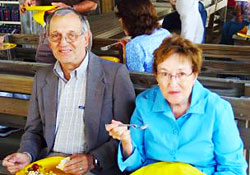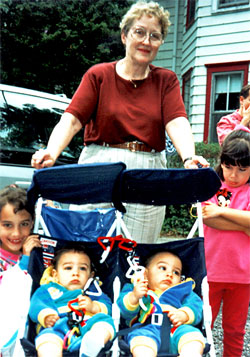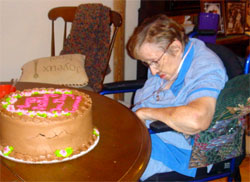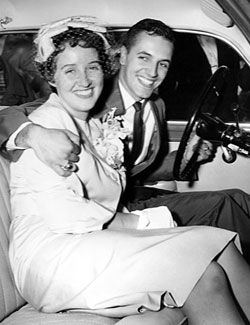Mary Richard
by Jean-Paul Richard
When did it all start? Was it when Mary tripped on the sidewalk and didn’t reach out to break her fall? She did that twice, years ago, bruising her face each time. Was it when she seemed to have a TIA while shopping with the granddaughters for a prom gown? She scoffed at that and her doctor found nothing in an MRI. Or was it the time she fell into her closet that evening while changing into her pajamas, breaking her hip?
There were other incidents in the ensuing months. Mary started talking more slowly, often excusing herself publicly by saying, “I used to be such a fast talker,” which would always prompt a few smiles and chuckles. She fell in exercise class, losing her balance. The instructor sadly told her she couldn’t continue in the class. That was quite a blow, but we found a “one on one” program that she began immediately and still participates in.
We consulted with her regular doctors, who referred us to neurologists and other specialists. All were sympathetic, yet not willing to give a definite diagnosis. If it was a puzzle to the specialists, one can easily imagine how much more difficult it was for our family!
Mary was 68 when the early symptoms first began, but we only received the diagnosis of corticobasal degeneration (CBD) just a year ago. Mary is now 75 years old.

Mary began having trouble reading and eventually had to drop out of the book club that she enjoyed so much. She even found it impossible to do her daily Sudoku puzzle when her eyes refused to focus and her fingers couldn’t form the numbers anymore.
She found she couldn’t paint anymore – a talent she had nurtured all her life. Her fine paintings hanging from the walls of our families’ homes serve as a testament to her skill. We even framed her last incomplete work and hung it in our living room. It was that good, even unfinished.
It became difficult for Mary to climb the stairs, so we added another handrail to ease the process. Eventually, we installed a stair climber for her. Even then, she went from being able to activate it herself to eventually requiring someone else to remotely move it up and down the stairs. She could no longer manipulate the switch on the armrest.

Then we acquired a voice board when she could no longer speak, to let her communicate by pressing images on the screen and having it speak for her. Even that is now difficult as she seems to be unable to reach the icons on the screen.
Lately, she had been unable to brush her teeth, even with an electric toothbrush, so it has become two person job. The same is true for her eating habits, which have progressed from using large utensils, to putting her food on a plate with a lip on the edge to push the food against, to feeding her blended foods because she is now unable to swallow whole foods.
Yes, we have adapted and changed the way we face each day’s challenges. The mobility and the loss of speech are probably the hardest to deal with though. It is like she is locked into her own body, unable to communicate with others. Yet I know she knows us, understands what happening around her, and wants to be part of our gatherings. Her eyes follow the grandchildren when she is with them. She was alert for her 75th birthday party. When we are alone, she sleeps much of the time now, as she isn’t agitated with frustration.

Is this a chronicle of despair? Hardly. Rather, it is a testament to how much the human condition can adapt when the need arises. Neither of us expected to be doing all that we now have to do to maintain a somewhat normal life for Mary. Nor did our four children expect to see their mother this way, but they are getting through it with kindness and concern. But by taking one day at a time, asking for help and seeking advice from those in the know, we are meeting each day successfully. We both know where it will all end, though. Unfortunately, we can’t talk about it together anymore.
The long drawn out character of corticobasal degeneration (CBD) means that we are actually going through the grieving process over an extended period of time. That has its advantages and disadvantages. We went through the denial early on, the anger that follows, and the realization soon after that the condition is serious and will only get worse. The bargaining with oneself is mixed with the recurring depression that one has to keep fighting off, if only to help Mary every day. Finally, the acceptance comes that it’s important to make each day count, and that we should start planning for her departure before it comes to pass.
Am I there? Yes.
Is she there? If only she could tell me!
